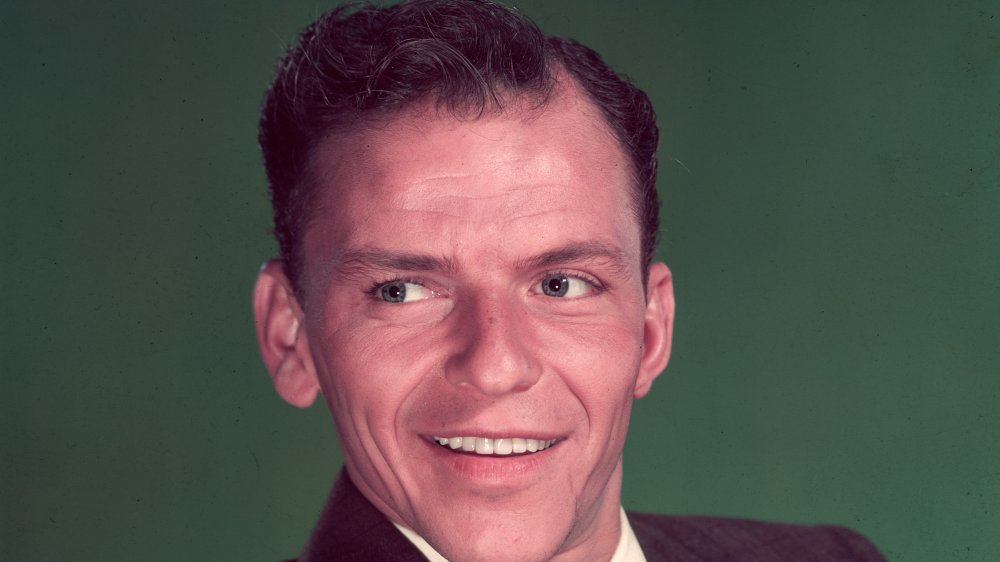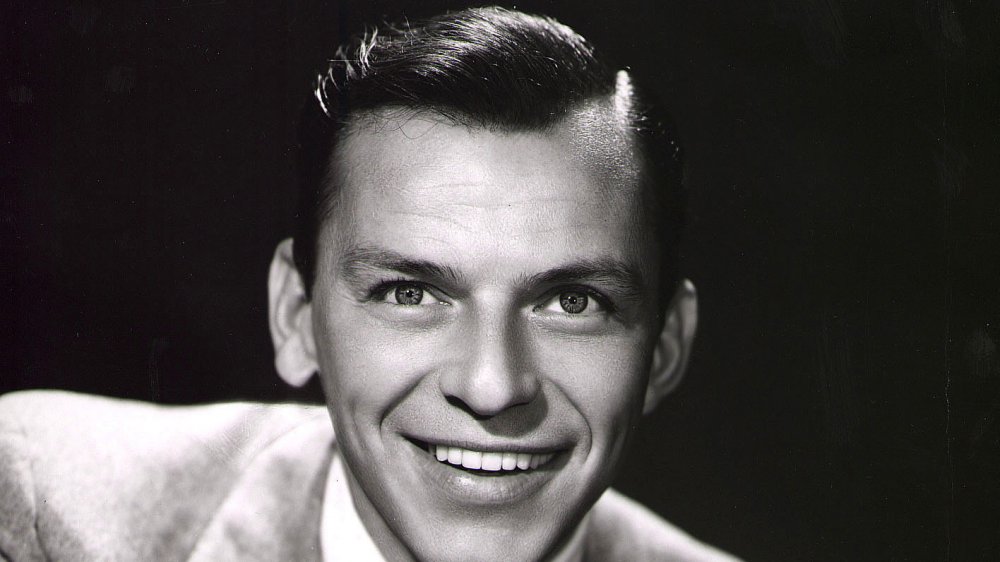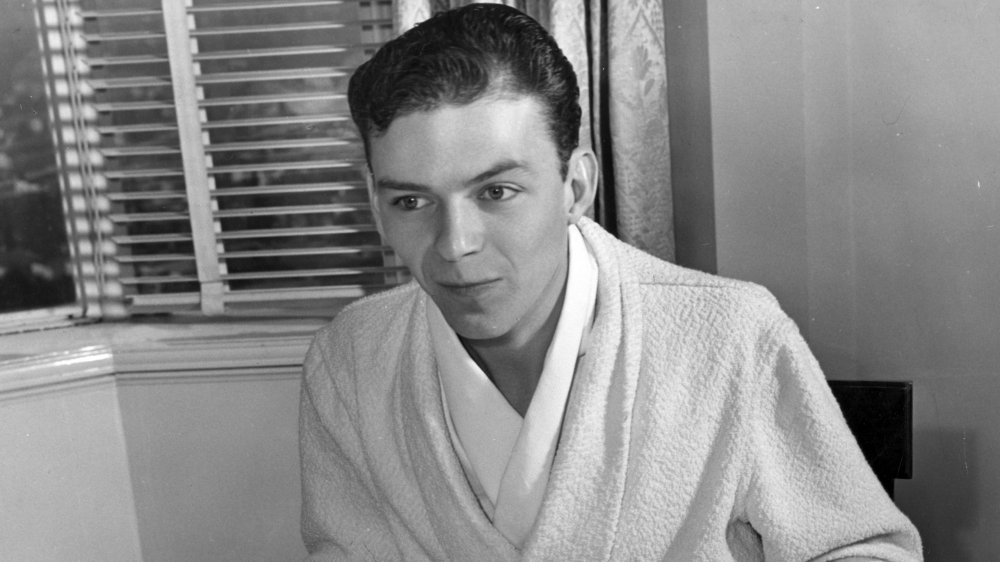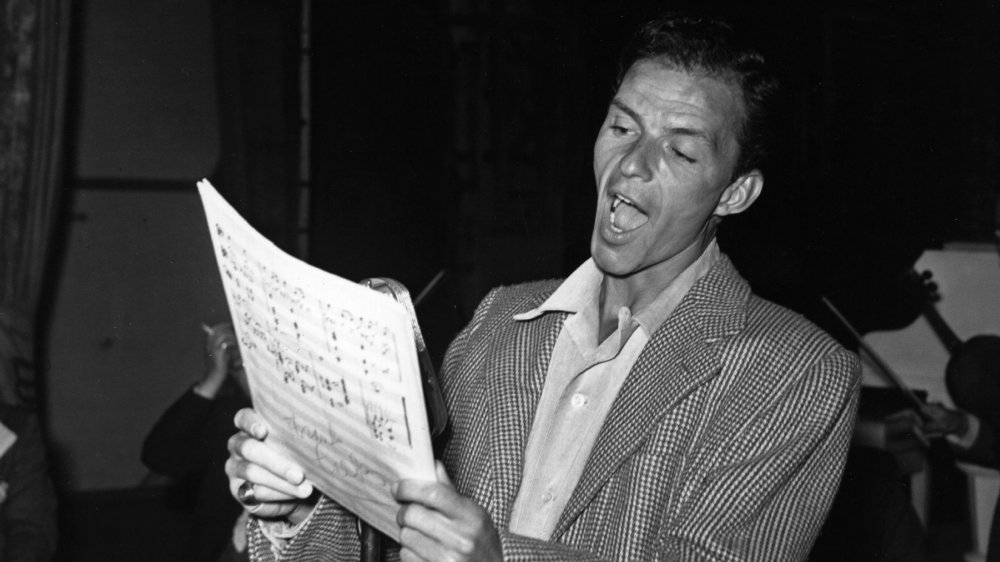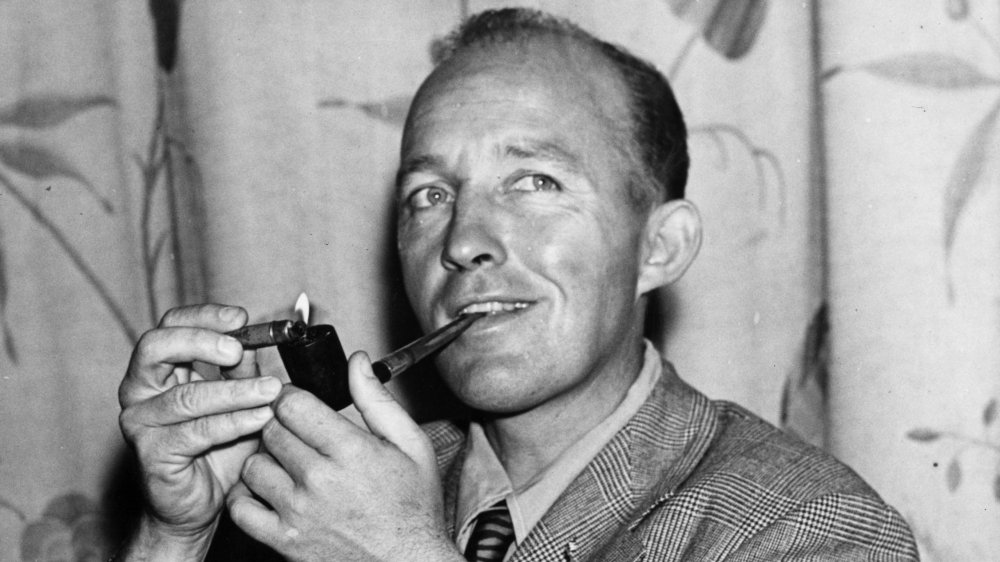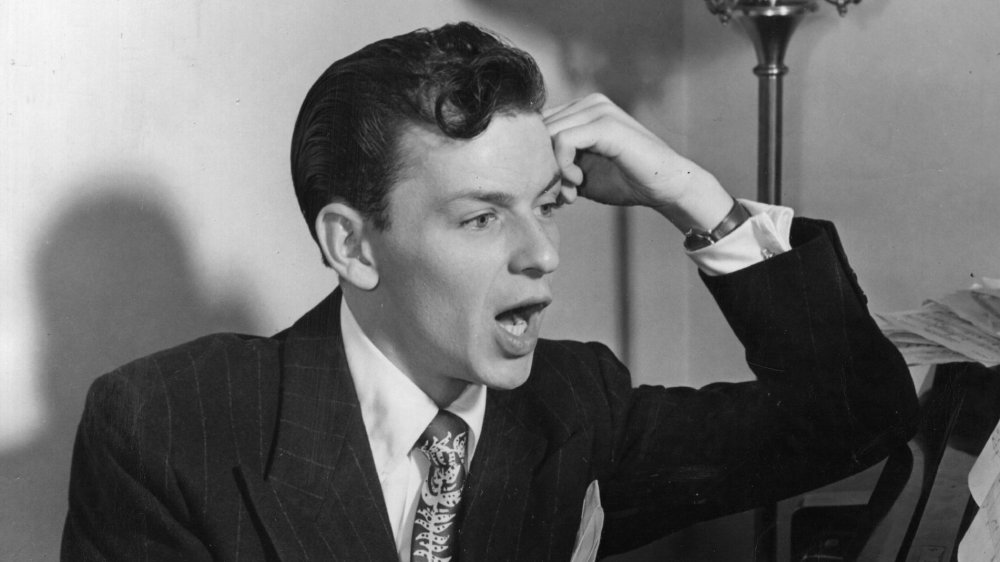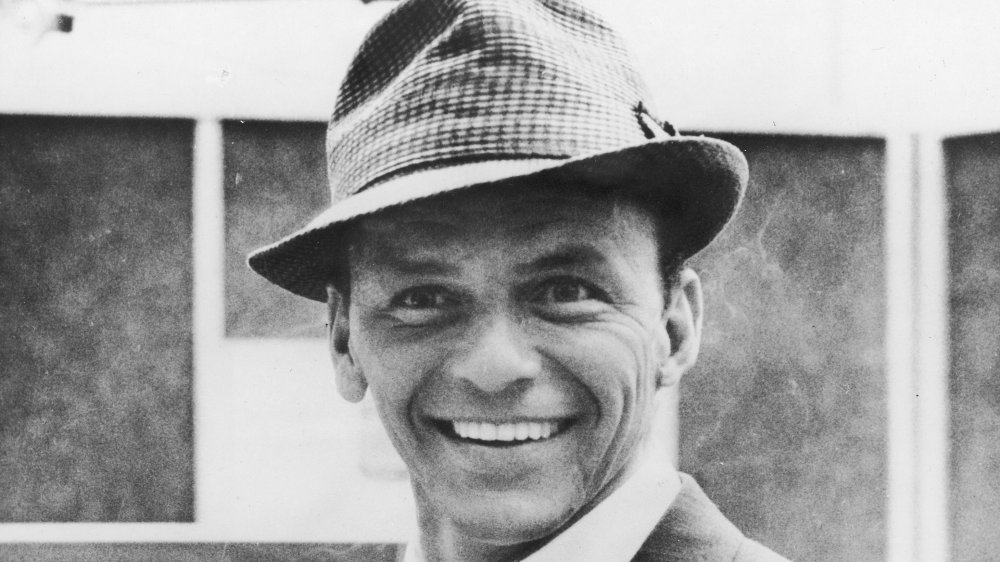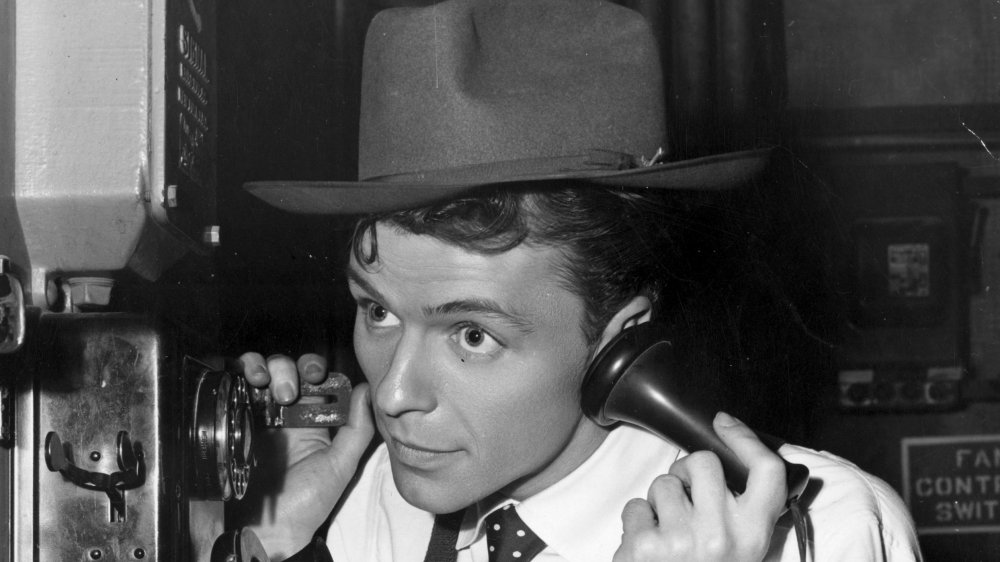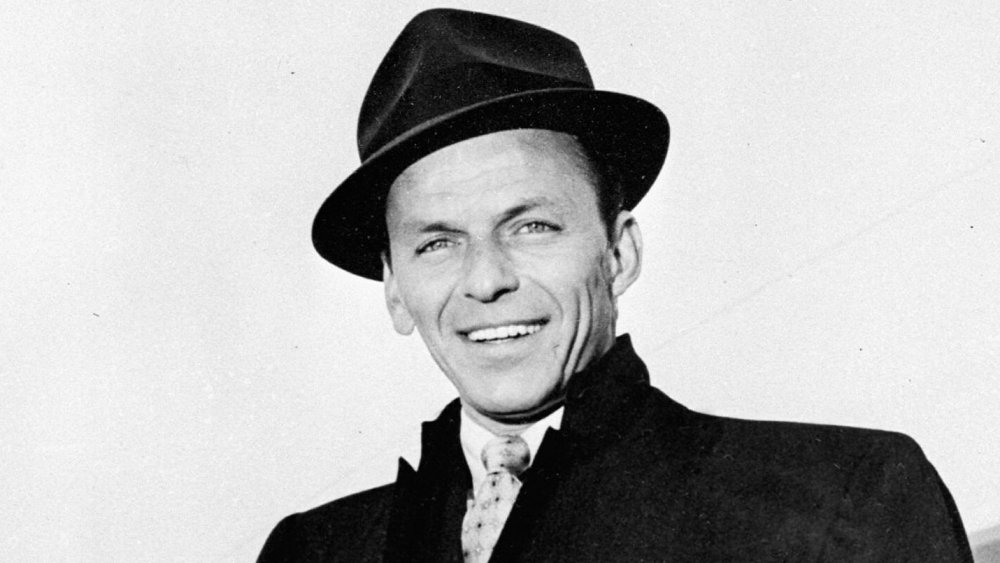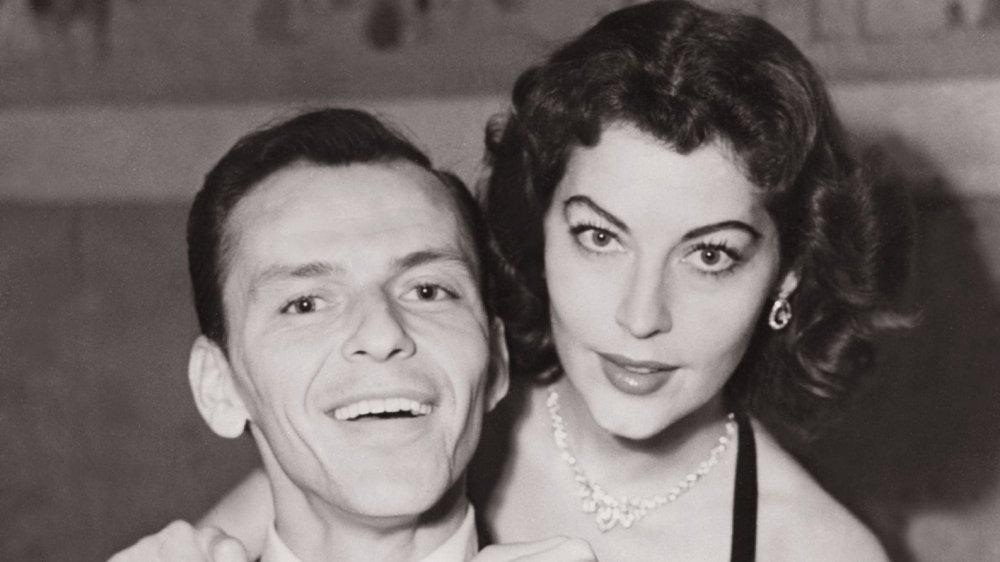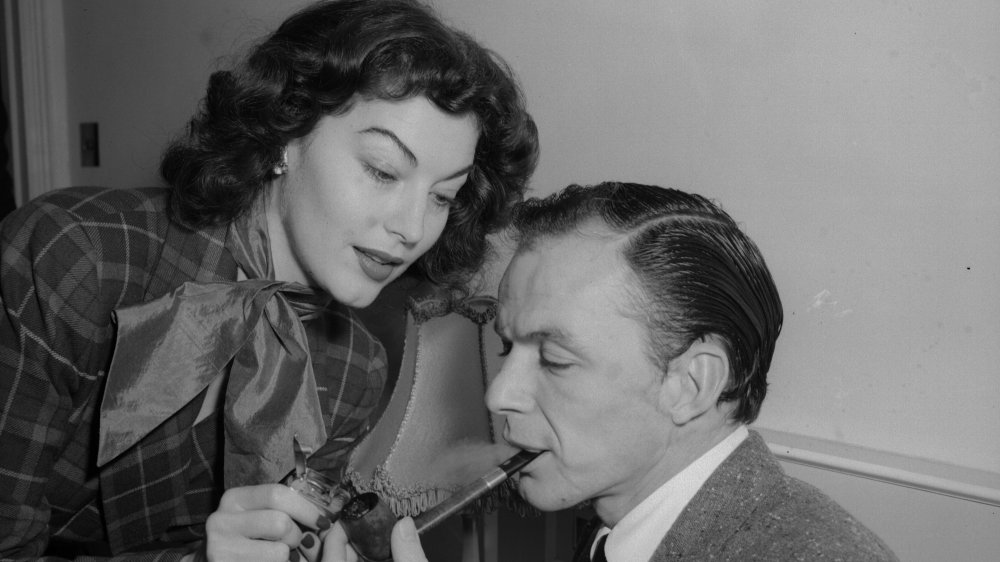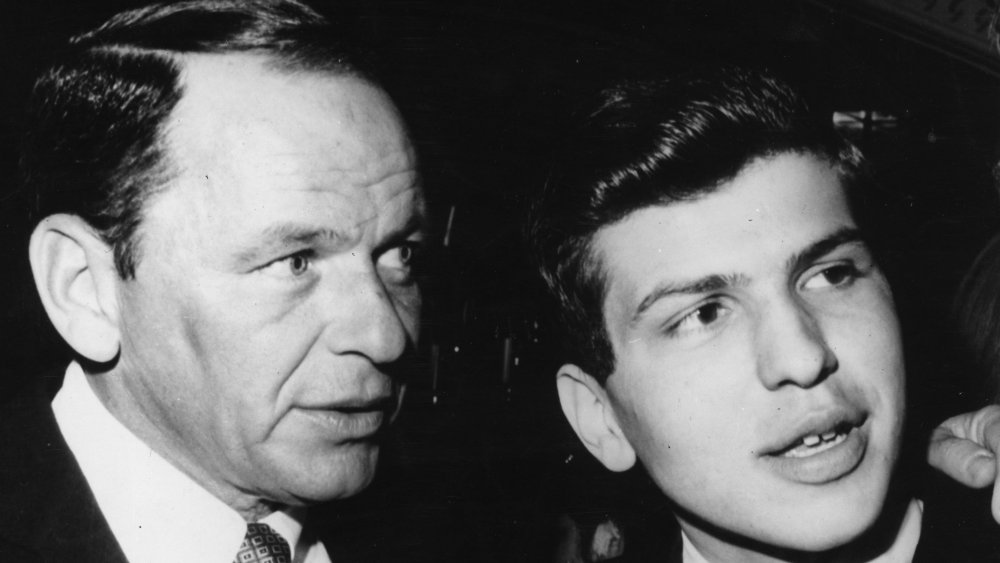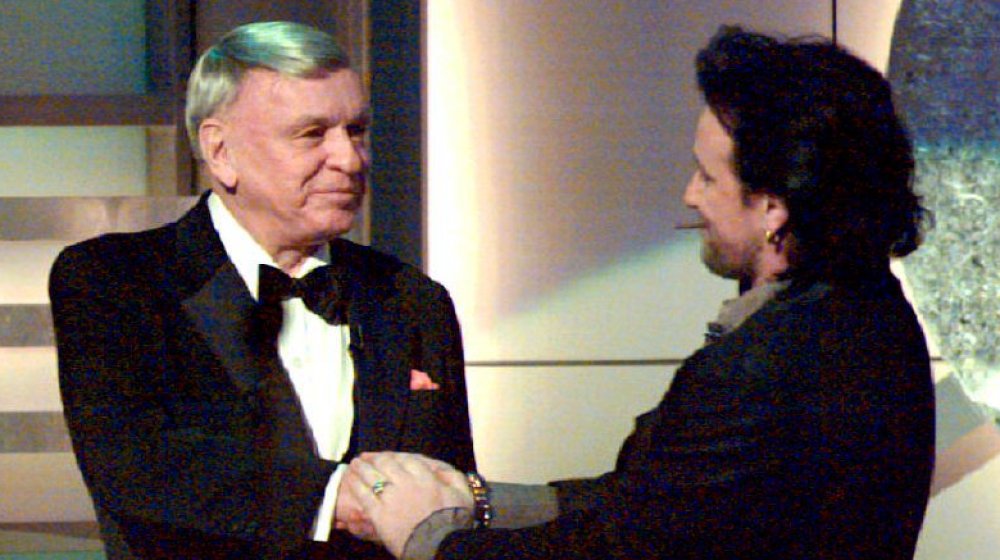The Tragic Real-Life Story Of Frank Sinatra
When people remember Frank Sinatra, they remember a musical legend — Ol' Blue Eyes, the Chairman of the Board, the Rat Pack, a singer who revolutionized music in the 20th century. He's inspired generations of musicians who try to capture just a hint of the charm, charisma, and style that Sinatra naturally exuded. After his death in 1998, President Bill Clinton (per Rolling Stone) spoke on behalf of the nation's mourners, "I think every American would have to smile and say he really did it his way.'"
However, for all of the reverence he's received and for all of his everlasting popularity, it's hard for most to realize just how complicated and gut-wrenching life could be for a man who seemingly had it all. Frank Sinatra will always be immortal to those who hear his music, but from his struggles with mental illness to his crushing loneliness to his desperation for true love, few realize just how painfully human Ol' Blue Eyes was.
Frank Sinatra had a traumatic birth
At the time of his birth, Francis Albert Sinatra was almost ruled dead on arrival. Born on December 12, 1915, in the kitchen of his parents' Hoboken, New Jersey, apartment, he weighed 13.5 pounds at birth (though he would only reach a height of 5'7" in adulthood) and had to be removed from the womb with forceps. According to PBS NewsHour, Frank was thought to be stillborn, as he was blue and not breathing. While the doctor was treating his mother, Frank's grandmother took the seemingly dead infant and ran him under cold water and slapped him on the back, which revived him.
And the mishaps didn't end there. Frank was actually supposed to be given the first name "Martin" after his father, but a misunderstanding led the priest to baptize the baby after his godfather, Frank Garrick. Frank's mother decided to leave it alone and keep the name, probably just out of sheer exhaustion from all the calamity that was her son's birth.
The forceps used during Frank's birth left him with facial scarring on the left side of his face, neck, and jawline. This led him to receive the punishing nickname of "Scarface" from his peers in adolescence. During his singing career, Frank would endeavor to hide his facial imperfections with heavy makeup.
Frank Sinatra was a lonely child
In spite of his talent, Frank Sinatra actually had to grapple with loneliness in childhood. Frank was the only child of Italian immigrants who were both very active and prominent in their Hoboken neighborhood. His father, Antonino Martino, or "Marty," owned a local tavern and was a part-time prizefighter. Frank's mother, Natalina, or Dolly, was a midwife and, according to The Irish Times, also helped desperate women to obtain illegal abortions. Dolly was also involved in local politics and was elected Democratic Ward Leader in their neighborhood.
His parents' work and activities meant they were often away, so young Frank was usually left on his own or with his grandmother. Most children in Frank's predominantly Italian neighborhood came from large families, while he grew up an only child, which was considered highly unusual. According to VQR, in a later interview with journalist Pete Hamill, Sinatra admitted that he longed for a sibling when he was a child: "I used to wish I had an older brother that could help me when I needed him. I wished I had a younger sister I could protect."
Frank Sinatra fought his way to the top
Sinatra didn't have an easy time achieving the fame and success that he craved. His parents weren't entirely supportive of his desire to be a professional singer, viewing it only as a cute little hobby. As noted by VQR, Marty Sinatra wanted his son to attend the Stevens Institute of Technology and have a steady job. However, while it took some time, once Dolly Sinatra understood her son's talent and ambition, she tried to help him wherever she could, from buying him sound equipment and sheet music to using her political connections to secure singing gigs for him. Dolly's pull even landed Frank a spot with the local singing group, the Hoboken Four, which started him on the path of professional recognition.
It soon became obvious that Sinatra was the only one of the group with genuine ambition and drive, so once the Hoboken Four broke up, Frank started to wait tables in between his singing gigs with local dance bands. After landing a solid gig with trumpeter Harry James, Frank's biggest break came in 1940, when he was discovered by renowned bandleader Tommy Dorsey, who offered him a much more lucrative contract. By 1942, Sinatra's reputation even eclipsed Dorsey's, which prompted him to seek out a solo singing career.
Bing Crosby Was Frank Sinatra's Inspiration -- And His Rival
Bing Crosby was Frank Sinatra's greatest inspiration for becoming a professional singer. A huge fan of the celebrity crooner, the teenage Frank had a picture of Crosby hanging in his bedroom. Crosby's warm, passionate, but laid-back singing technique was the foundation that Frank built on until he could develop his own unique style. Frank even met his idol briefly in 1935 at a Newark Club, but they wouldn't meet again for nearly a decade — when Frank was a huge star in his own right.
According to JAZZIZ, by the time the 1940s rolled around, Crosby was still popular, but Sinatra's fame was skyrocketing. Bing had fans, but he was never greeted by hoards of screaming, swooning teenage bobby soxer girls that made up Sinatra's fanbase — although, PBS NewsHour reports that during his early career days, Sinatra's publicist paid teenage girls $5 each to shriek to whip up enthusiasm for the singer. Crosby took Frank's rising popularity in stride, saying that Sinatra was a singer that comes around once in a lifetime — then jokingly adding, "but why did it have to be my lifetime?"
After that, a media-driven rivalry was born. The two competing crooners would frequently trade barbs and insults at each other on public radio broadcasts. The rivalry was played up for media attention, but it was never serious. Later, the two would perform duets together and co-star in movies such as High Society.
Frank Sinatra felt threatened by new talent
Frank Sinatra didn't mind a good-natured rivalry with Bing Crosby, but he felt highly intimidated by any new singers who could potentially knock him off his pedestal. In the early 1950s, singer Eddie Fisher was on the rise, and according to Collider, this caused Sinatra to spiral into a deep depression, believing that his career was over. What ended up saving his career was his transition into swing music.
Another time Sinatra's fame came under threat was from a singer named Jimmy Roselli, who was low-key known as "the other Sinatra." Roselli was ten years younger than Sinatra, an Italian American, and grew up in the same neighborhood of Hoboken. According to The Guardian, Roselli was incredibly popular with the Italian American crowd, even with Frank Sinatra's friends and his own mother, Dolly. Apparently, Roselli's voice had an even greater range than Sinatra's. When Dolly Sinatra asked Jimmy Roselli to perform at a benefit, but after Roselli refused to sing without receiving a fee, Sinatra used this as an excuse to blackball Roselli's career.
Frank Sinatra Definitely Had Mob Connections
Although he always refuted it, Frank Sinatra absolutely had ties to the mob. According to History, Sinatra's FBI profile reads like a complete guidebook to the Mafia. Sinatra was known to be good friends with the infamous Chicago mob boss Sam Giancana and his crew. He outwardly socialized with the Fischetti Brothers, Joseph and Charles, who were known to conduct illegal gambling operations. He blatantly partied with Detroit mobsters Anthony and Vito Giacalone. If Sinatra ever needed to get out of a contract or was simply ticked off about a perceived insult, someone could expect to get a visit from a couple of goons — visits that might or might not end with violence. In return, Frank would often perform a few shows as favors for his mob buddies.
For all of Sinatra's denials of Mafia ties, he didn't do much to conceal who his friends were or his participation in their shared activities — gambling, women, and money. The FBI kept a close eye on Sinatra, but he was never charged criminally for his mob-related activities or associations. Sinatra's full FBI record was not released until after his death.
Frank Sinatra had political ambition -- and hoped JFK could make it happen
Sinatra was an ardent supporter of the Democratic Party — most notably, John F. Kennedy. It's unknown how the two officially met, but Kennedy's sister, Pat, was married to Sinatra's fellow Rat Packer Peter Lawford. Kennedy appreciated Sinatra's glamour and rule-breaking attitude, and Sinatra greatly admired the power that Kennedy represented. Sinatra even introduced Kennedy to his longtime girlfriend Judith Campbell.
When JFK announced his bid for the presidency, Sinatra publicly endorsed his candidacy and avidly used his star power to generate votes. He organized donor dinners, appeared in political radio ads, and lent Kennedy's aides his private jet. His hit song "High Hopes" became the theme song of the Kennedy campaign. According to Biography, it has been speculated that JFK's father, Joseph Kennedy, was hoping to use Sinatra's mob connections and union ties to bring in the votes.
However, the Kennedy-Sinatra friendship crumbled after the election. FBI chief J. Edgar Hoover met with Robert Kennedy to reveal White House recordings of phone calls from Judith Campbell that tied JFK to Chicago mob boss Sam Giancana. According to Town and Country, another wiretap revealed that Sinatra was having an affair with JFK's married sister, Pat. Sinatra made it clear on the recordings that he was only using Pat to influence her brothers and steer the government away from his gangster friends' activities. The Kennedys agreed that Sinatra had to go.
Frank Sinatra had a violent temper
Despite his warm and romantic voice, Frank Sinatra was known to have an extremely short fuse. According to GQ, during a show in Hong Kong, a missed light cue prompted him to destroy his dressing room and his hotel suite, breaking priceless antiques during the tantrum. Another time, while in a drunken rage, he drove a golf cart through a shopping mall window. J. Randy Taraborrelli's biography Sinatra: Behind the Legend details how the singer once threw a plate of pasta at the wall in an Italian restaurant because he deemed the pasta too soggy.
Referenced in The New Yorker's review of James Kaplan's biography of Frank Sinatra, Ol' Blue Eyes also had a habit of bullying venue employees and less famous entertainers and getting his mob friends to beat up people he didn't like. He seemed to have a particular dislike of stand-up comedians, likely due to his personal insecurities and fears of being publicly humiliated. Comic Shecky Greene made a remark that angered Sinatra, and Greene was soon mobbed by a group of Sinatra's friends. Comedian Jackie Mason made a series of jokes about the much older Frank Sinatra's marriage to 21-year-old Mia Farrow, which resulted in anonymous death threats. According to Vanity Fair, when Mason refused to stop making Frank Sinatra jokes, shots were fired into his hotel room. He later had his nose and cheekbones broken by a complete stranger.
Frank Sinatra had a volatile love life
Frank Sinatra had numerous romances and was married four times, and accounts seem consistent that while Sinatra was passionate, he was also unfaithful, temperamental, and controlling.
Sinatra first married Nancy Barbato, whom he wed in his early twenties, and they had three children: Nancy, Frank, Jr., and Tina. The marriage ended because of his serial cheating. Sinatra married actress Ava Gardner shortly after the divorce was finalized. Sinatra's marriage to Gardner was the most publicized due to their explosive public fights. Both were heavy drinkers, and both had affairs. According to People, it was also reported that Gardner had two abortions after finding herself pregnant, insisting that their relationship was too unstable. The two divorced after six years.
Later, the 51-year-old Sinatra married 21-year-old Mia Farrow. According to The Vintage News, Sinatra demanded that Farrow give up her acting career. Farrow agreed, but, frustrated with the housewife's life, she accepted the lead role in Rosemary's Baby. Sinatra relented and arranged a small part for Farrow with his newest movie after she was done. However, the filming of Rosemary's Baby fell behind, and despite Sinatra's orders that she quit the film, Farrow held fast. Sinatra served her with divorce papers.
Sinatra's fourth marriage was to Barbara Marx. After Sinatra's death, Marx reported to USA Today that he was very much a "Jekyll and Hyde" husband, showering her with affection and expensive jewelry one minute, screaming and threatening the next. This final marriage lasted until Sinatra's death.
Frank Sinatra suffered from severe depression
Most would think a celebrity like Ol' Blue Eyes would have very little to be depressed about. He seemed to have it all — talent, money, success with women, and influence. However, Sinatra was known to suffer from extreme depressive episodes. If he was alive today, he'd probably have been diagnosed with bipolar disorder. Biographer J. Randy Taraborrelli said of the singer: "Frank described himself as 'an 18-carat manic depressive'. He was a bipolar, moody, difficult man who drank heavily, with a sense of entitlement twisted by celebrity."
He tried to commit suicide several times. According to Collider, when Sinatra feared being dethroned by Eddie Fisher and the end of his career, he turned on the gas and put his head in his oven. His manager found him before it was too late. Per PBS NewsHour, while in the throes of his volatile marriage to Ava Gardner, Sinatra had at least one other documented suicide attempt with a gun. Gardner tried to wrestle the pistol away from him, the gun went off, but the bullet luckily missed them both. According to Taraborrelli, Sinatra longed for love and companionship but had little understanding of how to maintain a healthy romantic relationship and was always searching for the next best thing.
If you or anyone you know is having suicidal thoughts, please call the National Suicide Prevention Lifeline at 1-800-273-TALK (8255).
Frank Sinatra's son was kidnapped
Out of his three children, Frank Sinatra had one son, Frank Jr., who had ambitions to become a singer like his father. His career was already budding at the age of 19. However, Frank Jr. also started attracting more malicious attention. According to the FBI, on December 8, 1963, Sinatra Jr. was performing a gig at Harrah's Club Lodge in Lake Tahoe. He was in his dressing room with a friend when someone knocked on the door, claiming to have a package to deliver. Instead, two men entered, tied up, and blindfolded the friend and then forced the singer out a side door and into a waiting car.
The friend was able to free himself and notify the police. The kidnappers, Barry Keenan, Joe Amsler, and John Irwin, contacted the elder Sinatra and demanded a ransom of $240,000 for his son's return. With the FBI's help, Sinatra Sr. paid the ransom and let the police track down the kidnappers. Keenan and Amsler took the suitcase, but Irwin was getting nervous and decided to free Sinatra Jr., whom the police found in Bel-Air after he had been walking for miles. The FBI apprehended the three kidnappers and recovered the ransom money.
The kidnappers' defense tried to paint Sinatra Jr. as the perpetrator, claiming he masterminded his own abduction for publicity. The FBI's evidence proved contradictory to this claim, and all three kidnappers were convicted.
The Loss Of An Icon
Frank Sinatra died of a heart attack at the age of 82 on May 14, 1998, at Los Angeles' Cedars-Sinai Medical Center. His wife, Barbara Marx, and his three children were at his bedside. According to PBS NewsHour, Sinatra's last remaining years were filled with significant health problems, such as heart and breathing problems, high blood pressure, pneumonia, and bladder cancer. He had also been diagnosed with dementia, brought on by Alzheimer's. As the end approached, Sinatra seemed to recognize that his time had arrived, as his last words to his wife were, "I'm losing."
Smithsonian reports that Sinatra was buried with a pack of Camel cigarettes, a bottle of Jack Daniel's whiskey, a Zippo lighter — all of his favorite brands — and a dollar's worth of dimes. In a Rolling Stone interview, singer Bono of U2 spoke on the death of Sinatra — with whom he performed a duet — and the loss of an iconic performer: "Frank Sinatra was the twentieth-century, he was modern, he was complex, he had swing and he had attitude. He was the boss but he was always Frank Sinatra. We won't see his like again."
